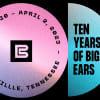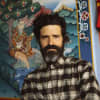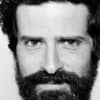Every Tuesday, FADER deputy editor Eric Ducker gets on instant messenger and "discusses" a subject that's been on his mind with another member of our staff or a special guest. After the jump, read his condensed (and emoticon-free) conversation with contributing writer Daniel Arnold, who handled all the text for the recent New Folk edition of F2, about Devendra Banhart and whether listeners are forsaking him even as he creates some of the most interesting work of his career.
Eric Ducker: Devendra Banhart has been releasing music for six years now, and I feel like it’s only getting more interesting. However, as time has gone on, it seems that most people like him less and are less excited about what he’s doing. Would you agree that’s a fair statement?
Daniel Arnold: Well... I don’t know about most people. Maybe most of the people who were REALLY into him in the beginning like him less and less. But I don’t know that I’d say most people. I think he’s definitely alienated a lot of the people who put him where he is. That I think is fair.
ED: How has he alienated them?
DA: I’d say he—more successfully than most—created his own mini-Devendra universe. He’s got all the recurring characters and his own language and everyone dresses in the same crazy way and sings in crazy voices. And I think that it’s part of the typical life cycle of any artist that’s too interesting to stay in the first world they create. He created this “place” where a certain subset of people felt really comfortable and then he was like, Eh... fuck that place. So the people who saw him as this messiah who delivered them to this fairy world got left behind because he couldn’t take it seriously anymore.
ED: I find his new recordings so much more exciting to listen to. I can’t really think of any context in 2008 when I would want to listen to Oh Me Oh My...
DA: Agreed. Mostly. I loved that stuff when it first surfaced. I was pretty blown away by it. And honestly, there are still a few songs that I’ll play through if they come up in a shuffle, but I can’t imagine sitting through the whole thing and paying attention. But at the same time, I still haven’t really cracked that Megapuss record.
ED: You should. It’s really zany.
DA: Zany in a good way?
ED: I think it’s zany in a good way. It’s definitely him indulging himself in a way people may not be interested in, but I think it gives a taste of his sense of humor. I think the obvious reference point is Frank Zappa, except basically no interest in virtuosic playing.
DA: But do you like it out of context? Because I’m way into it as a fuck you. I’m behind him one hundred percent on that. I love the sentiment, but I haven’t been able to get into it as music. Or do you not even see it as a fuck you? I’ve never been a big Zappa guy, so I don’t have much of that to use for contrast. I’m stuck with this crumby Bob Dylan filter that is definitely misapplied
ED: I think it would be more of a fuck you if he released it as Devendra Banhart album. But he called it Megapuss and put a picture of him and another dude naked with a knife on the cover. I appreciate that he’s like, We’re having a ball and following our own weird impulses and if you want to take a peek into our world that’s great but you don’t have to get involved.
DA: Have you seen Megapuss live?
ED: I haven’t. How were they at Festival in the Forest in Big Sur?
DA: Interesting... Devendra didn’t really come off as a leading man. Greg Rogove and Fab Moretti majorly overshadowed him, and he seemed pretty bummed in general throughout the weekend. Maybe that’s too much to assume, but he seemed to be pretty disengaged.
ED: Like he was over that world?
DA: Yeah. Like maybe he was really bummed about Natalie Portman or maybe it was just a paycheck and he had moved on.
ED: GOSSIP
DA: Ha. Yeah. Which honestly I think is a major factor. He’s entered the public consciousness, he’s in the tabloids. In a way it’s perfect and hilarious and subversive, but is it giving him too much credit to assume that it had no effect on him? That he’s so “Devendra” that he was able to enter and exit that world uncorrupted?
ED: That stuff has to affect you, now matter who you are. You have to become so less trustworthy and more self-conscious, and Devendra’s whole thing is how unself-conscious he is.
DA: But is that really true?
ED: I don’t know. He seems pretty comfortable with who he is.
DA: I agree, but he’s also a total caricature who has never seemed to have any objection to the attention he was getting. He’s an interesting icon in that way. Being so used to these tortured artists, he seems to love the spotlight.
ED: I remember when they had the ArthurFest here in LA in 2005 and he was playing in Vetiver. Everyone was running around outside in flowing skirts and facepaint, and there were literally five dudes basically dressed up as Devendra Banhart with no shirt and metal headdresses. Then he showed up wearing a button up shirt and a vest and his hair in a ponytail
DA: He’s a total fashion victim in a way that I can’t criticize. I think he pulls it off brilliantly. I’ve been hearing stories forever from friends who work at Marc Jacobs about how he’d come in and they’d spend hours in the dressing room with him, dressing and undressing him.
ED: Then there’s that paparazzi picture of him with Natalie Portman and they’re wearing matching navy peacoats. That shit was awesome and hilarious.
DA: Yeah! The peacoats! And the white sunglasses! Hilarious! And in moments like that, it does seem like he’s totally in control, like he can float above the surface and be unfazed by the corruptness of the world.
ED: Have you ever interviewed him?
DA: No. You?
ED: I did for that Jerry Garcia icon issue we did. It was really fun. He didn’t have much to actually say about the Grateful Dead and his feelings about their music, but he had great semi-related anecdotes and totally unexpected insights. Plus he just exuded good vibes. Interviews can be so awkward, especially on the phone, but he just pushed right past that.
DA: The first time I went to Big Sur I made small talk with him for a while and had a similar experience. During and after I kept thinking of that famous thing everybody tells you about Bill Clinton about how when you talk to him, no matter how insignificant you are, you feel like you’re the only person in the room. It wasn’t quite that, but he was so open and inviting with those good vibes, that it made you feel like you had floated up to his level. I realize that I’m being a huge teenybopper and deifying this regular dude who’s years younger than me. but I’m pretty comfortable with that. I think he’s got a genuinely magical way about him.
ED: Let’s get back to the music. Did you like Smokey Rolls Down Thunder Canyon?
DA: I loved it. I loved it more tentatively in the beginning than I do now, and then I saw it live and was completely blown away. I am very aware of being way too enthusiastic about things that move me, but after that show—which was so perfectly even and restrained without sacrificing any energy or performance, it was so confident and self-possessed—I felt like I had seen what was supposed to come after Abbey Road. Which is grandiose, I know, but it felt like those guys had made good on all these old musical promises that never got cashed in. Do you think I’m crazy?
ED: Not at all. If we can’t feel music deeply and passionately, our jobs shouldn’t revolve around music. It’s funny that Devendra is always couched as an artist “from another era.” I’m not sure if that’s apt or not. Or if what makes him of this era is that he doesn’t totally fit with it.
DA: Right. I think it’s pretty much just his clothes that draw that comment, but I agree that not fitting in is much more significant. He’s got this timeless far-outnes that I think has rightly gotten him as many Tiny Tim comparisons as it has Marc Bolans.
ED: My feeling about his music is that now should be the time when more and more people are discovering him. He’s making fuller, more realized songs. He’s not singing in such a funny voice. And he’s creating multi-dimensional albums. Instead it feels like people who once embraced him are starting to shun him more and people who didn’t embrace him in the first place won’t do so because of the shit he was associated with when he started. To me, that’s a shame.
DA: Agreed, but when they cast George Clooney in Batman & Robin, everyone was like, “Weeeeird, I’m supposed to believe that dude from ER is Batman? No way, this isn’t a serious actor, this isn’t Batman, this is Dr. Ross.” And granted he may have had more people rooting for him, but now when you look at Clooney, you see a major movie star. And when you see an ER rerun it’s like looking at his yearbook photo. I think Devendra’s having a Clooney transition. Dylan at Newport. Whatever you wanna call it. And definitely the attention span for evolution is not nearly what it was, but I think he’s talented and different and special enough to weather whatever alienation may come with those changes. Do you think he’ll fade away? That he’s had his moment and it’s done? I never even considered that as a possibility, but I suppose there are pretty even odds of both outcomes.
ED: Everyone eventually fades away, but I think he easily has more years and more albums where people will be willing to invest resources in him. He’s a creative dude and with seemingly no limit to his output. And though he inundates listeners on each album, he doesn’t inundate the world with material constantly.
DA: And in that capacity, seemingly no self-consciousness, no torture. There was a time when my roommate and I were delusional enough that we thought we could get him to play in our living room. This was within the past year or two. We talked it up enthusiastically enough that his people didn’t totally dismiss us, but they did eventually turn us down with the explanation that he so completely immerses himself in every project—involuntarily so, to an O.C.D. extent—that they didn’t even want to mention the possibility to him because they worried that they wouldn’t hear from him for months. That, come to think of it, is pretty good insight into Megapuss, that he’s wide open to inspiration, no matter how it’s packaged, and that he’s willing to see it through as a feeling more than a personal project. It’s kind of a dangerous way to be.


